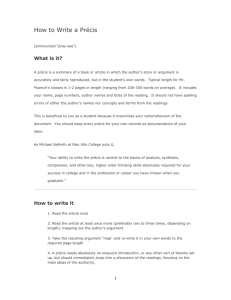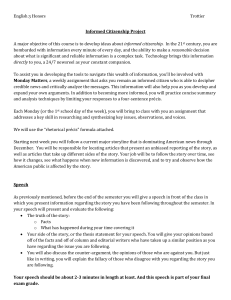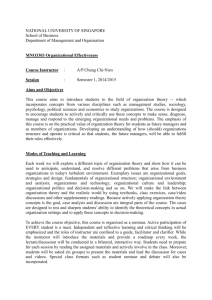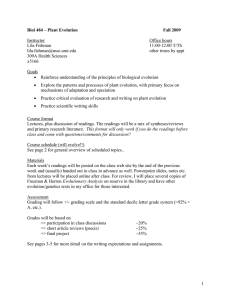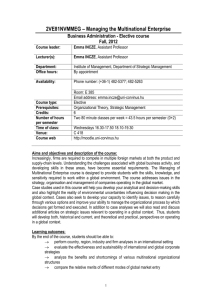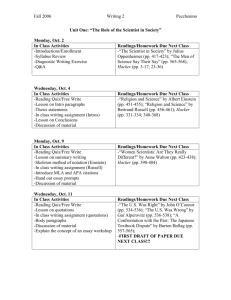Reading
advertisement
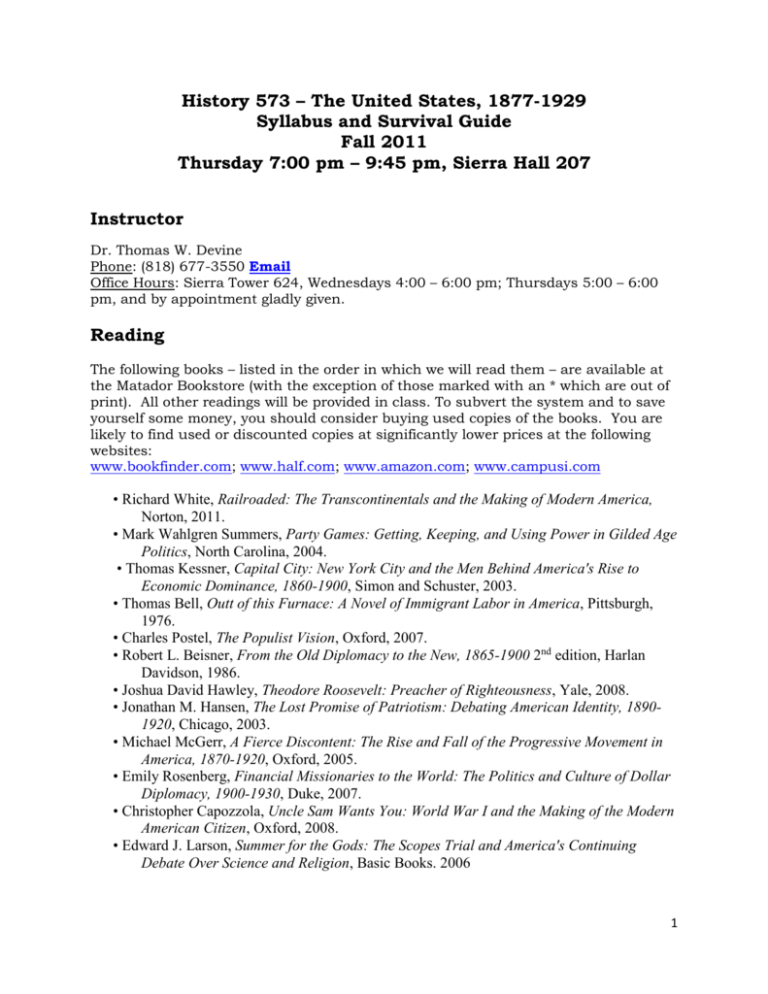
History 573 – The United States, 1877-1929 Syllabus and Survival Guide Fall 2011 Thursday 7:00 pm – 9:45 pm, Sierra Hall 207 Instructor Dr. Thomas W. Devine Phone: (818) 677-3550 Email Office Hours: Sierra Tower 624, Wednesdays 4:00 – 6:00 pm; Thursdays 5:00 – 6:00 pm, and by appointment gladly given. Reading The following books – listed in the order in which we will read them – are available at the Matador Bookstore (with the exception of those marked with an * which are out of print). All other readings will be provided in class. To subvert the system and to save yourself some money, you should consider buying used copies of the books. You are likely to find used or discounted copies at significantly lower prices at the following websites: www.bookfinder.com; www.half.com; www.amazon.com; www.campusi.com • Richard White, Railroaded: The Transcontinentals and the Making of Modern America, Norton, 2011. • Mark Wahlgren Summers, Party Games: Getting, Keeping, and Using Power in Gilded Age Politics, North Carolina, 2004. • Thomas Kessner, Capital City: New York City and the Men Behind America's Rise to Economic Dominance, 1860-1900, Simon and Schuster, 2003. • Thomas Bell, Outt of this Furnace: A Novel of Immigrant Labor in America, Pittsburgh, 1976. • Charles Postel, The Populist Vision, Oxford, 2007. • Robert L. Beisner, From the Old Diplomacy to the New, 1865-1900 2nd edition, Harlan Davidson, 1986. • Joshua David Hawley, Theodore Roosevelt: Preacher of Righteousness, Yale, 2008. • Jonathan M. Hansen, The Lost Promise of Patriotism: Debating American Identity, 18901920, Chicago, 2003. • Michael McGerr, A Fierce Discontent: The Rise and Fall of the Progressive Movement in America, 1870-1920, Oxford, 2005. • Emily Rosenberg, Financial Missionaries to the World: The Politics and Culture of Dollar Diplomacy, 1900-1930, Duke, 2007. • Christopher Capozzola, Uncle Sam Wants You: World War I and the Making of the Modern American Citizen, Oxford, 2008. • Edward J. Larson, Summer for the Gods: The Scopes Trial and America's Continuing Debate Over Science and Religion, Basic Books. 2006 1 Spirit of the Course This course will offer an interpretive survey of political, economic, cultural, and social trends in the United States from approximately 1877 to 1929. If all goes according to plan, you will leave in December with a broader and deeper knowledge of the events of this period and their significance in shaping what we call “modern” U.S. society. It is my hope that you will also finish the course with something more: a rich sense of the “fabric” of this era – a feel for how people lived their daily lives, the tragedies they suffered, and the triumphs they celebrated; an appreciation for the ideas, ideologies, fads, and follies that intrigued and seduced them; an understanding of the problems and tough decisions that confronted both everyday people and top policy makers; and, perhaps most importantly, a recognition of the contingencies of history and an empathy for the historical actors who benefited from or fell victim to these contingencies. I have made a special effort to assign readings that represent the latest (if not always the most widely held) views on various topics, though I have also included a few “old chestnuts” that have stood the test of time. You will notice that the readings throughout the course come from various ideological and methodological perspectives. I encourage you to be critical of both the readings and what I say in class when you find the arguments expressed to be unpersuasive. (More often that not, what I’m saying is meant to provoke a critical rejoinder and I will eagerly defend the most outrageous positions just for the joy of playing devil’s advocate.) Themes Though we will be covering a wide variety of topics, there are certain themes that we will be revisiting throughout the course of the semester: the effects of industrialization, immigration, and urbanization on the nation’s economic and political development the changing relationship over time between government and individual citizens the United States’ emergence as a global economic power changing attitudes regarding race, gender, and the rights of the individual versus the rights of the group the effect of social crises such as war and depression on American intellectuals and intellectual life the ongoing struggle to balance liberty and equality within a democratic context the factors accounting for the rise and fall conservative and progressive social movements disputes among Americans over what constitutes a “good society” You will also have the opportunity to follow the historiography that has developed around the topics we will explore. Though the emphasis of the course will not be on historiographical issues, I will introduce and we will all discuss scholarly controversies where appropriate. 2 Grading Class Participation --30% Oral Presentation --10% Analytical Essay 1 [Due Oct. 2 OR Oct. 30] --15% Analytical Essay 2 [Due Dec. 4] --15% Semester Project [Nov. 20] --30% Explanation of Requirements Completing the Reading There’s no getting around it – this class requires a lot of reading. But, as a Masters level seminar, it is supposed to. To succeed in this course, you will need to complete the reading, but you will also need to have given it some thought. Read with a pencil in hand – take notes in the margins. Record terms that are unfamiliar to you or that you don’t understand, points that you find interesting or surprising, arguments with which you strongly agree or disagree, methods of research or analysis that seem especially creative or insightful (or misguided and unpersuasiv), or ideas that connect to things we’ve talked about in previous classes. Also, read smart – don’t read every single word of the first 4 chapters and nothing thereafter because you ran out of time. If you catch the argument the author is making, don’t sweat all the details or supporting examples – skim over them and get on to the next major point. It is more important to have gotten the gist of an entire book than to master every aspect of the first one-third of it. Participation in Discussion This is a seminar-style course in which active participation in the weekly discussions is crucial to the class’s success. Our meetings will be conversations – free, open, and informal exchanges of ideas based on the assigned readings – and I expect everyone to take part. I will do my best to insure each student has ample opportunity to contribute, but, ultimately, it will be up to you to make certain that you remain an active participant rather than a passive observer. At the mid-point of the semester, I will provide each student with a brief, written evaluation of his or her class participation. Leading Discussion One person will be responsible for leading the discussion each week. That person will compose a list of 8 questions that address the major themes and issues raised in the reading. Each discussion leader should meet with me briefly to go over his or her questions. (If need be, this exchange can be done over email.) Optimally, the discussion leader will have finished writing the questions at least 24 hours before the seminar so I can distribute them to everyone via email attachment. If you have not led a discussion before, I recommend setting up an appointment with me so we can discuss some strategies for leading effective discussions. Your leading of discussion 3 will not receive a grade per se, but will be taken into account in the calculation of your participation grade. Précis One person will be responsible for producing a single-spaced 2-page précis of the readings for each week. This assignment is meant to be a summary rather than a review, though you may give an overall evaluation of the book in the final paragraph. The person who writes the précis should email it to me as an attachment at least 3 hours before class so I can proofread it and make copies for the rest of the class. This assignment, too, will not receive a grade per se, though in calculating your participation grade, I will take into account the quality of and amount of effort you appear to have put in to your précis. Oral Presentation One person will be responsible for giving a 15 minute oral presentation each week. I will not allow you to go beyond 20 minutes, so be sure you know ahead of time how long your presentation will run. The presentation should elaborate on or critique the week's readings. You may want to focus exclusively on a particular theme or argument, the book or articles' take on a specific historiographical controversy, or compare/contrast the author’s work to others who have written on the topic. Alternatively, you might want to look at some primary sources and see if they lead you to the same kinds of interpretations that the author offers. If your topic lends itself to doing so, your oral presentation can feature a short audio-visual component that might allow us to sample in some way the cultural forms we have read about. (This could entail showing a clip from documentary footage or from a movie discussed in the reading; showing power point slides of contemporary illustrations; playing an excerpt from a radio program, song, or musical performance; displaying illustrations, etc.) At some point during class, usually right after the break, you will have the floor to give your oral presentation and to field questions from the class. At the end of class, please provide me with a copy of your presentation notes. Analytical Essays These two 1500-word assignments will give you the opportunity to respond to a specific question in a concise, tightly argued essay. You will have several topics from which to choose. I will distribute the topics ten days before the paper is due. Semester Project Select a topic from the period covered in the course that you find to be of interest and do some outside reading on it. I recommend drawing on a variety of books, book chapters, and journal articles. Your choice of focus need not be directly related to the material covered in the course. Indeed, this is your opportunity to investigate a subject area that the course may neglect. After your reading has made you an “expert” on your topic, compose a 10-12 page essay assessing the various sources you have consulted and offer and defend your own thesis pertaining to your topic. You will hand in a final draft and one revised draft. Bringing Food On one occasion during the semester, each person will bring a snack for the entire class to enjoy at the break. Optimally, your culinary contribution will be related in some clever way to the week’s discussion topic. I can refrigerate or store the food for 4 you if you need me to -- just give me advance notice. Creativity and imagination in the selection of what to bring will be duly noted. Surviving History 573… Attendance It is important, and it is expected, that you will attend every session. Inevitably, an occasion may arise when you are unable to attend. Out of fairness to your classmates who do attend every week, however, each absence past the first two will bring down your final grade. Any absences beyond four will put you in jeopardy of failing the course. Also, given the heavy weight placed on in-class discussion, any absence is likely to detract from your participation grade. To make up for a missed class, you may turn in a précis of no more than 1500 words summarizing the reading for the class you missed. Problems I appreciate that most CSUN graduate students are stretching themselves quite thin, often working full time while taking classes at night. If you are feeling overwhelmed, find yourself falling behind, or are having any problems outside of class that are adversely affecting your performance in class, be sure to let me know. Do not wait until the end of the semester when it will be too late. I am more than willing to work with you to insure you “survive,” but I need to know you are having difficulties. You will find that as long as you keep me up to speed, I will be very sympathetic. Discussion Topics and Assignments Schedule 1. Sept. 1 Introduction: An explanation of course objectives, mechanics, and procedures. 2. Sept. 8 Rethinking the Railroads: The Economic Consequences of Rapid Expansion Reading: Richard White, Railroaded 3. Sept. 15 “The Era of Good Stealings” – Politics and Politicians in the Gilded Age Reading: Mark Summers, Party Games 4. Sept. 22 “If I Can Make it There…” – New York City and the Rise of Corporate Capitalism Reading: Thomas Kessner, Capital City 5. Sept. 29 “From the Boat to the Mills:” Immigrant Workers’ Experiences Reading: Thomas Bell, Out of this Furnace 5 6. Oct. 6 An Alternative America: The Populist Response to Industrialization Reading: Charles Postel, The Populist Vision 7. Oct. 13 Aggressive Imperialism or Ambivalent Expansionism? – U.S. Foreign Policy at the Turn of the 20th Century Reading: Robert Beisner, From the Old Diplomacy to the New 8. Oct. 20 Race, Reform, and Righteousness: Theodore Roosevelt and the Progressive Impulse Reading: Joshua David Hawley, Theodore Roosevelt 9. Oct 27 Democracy for Whom? – Reconsidering Citizenship in the Progressive Era Reading: Jonathan M. Hansen, The Lost Promise of Patriotism 10. Nov 3 Progress for Whom? – The Search for Order and its Discontents Reading: Michael McGerr, A Fierce Discontent 11. Nov 10 “We’re Here to Help”: Imperialism American Style Reading: Emily S. Rosenberg, Financial Missionaries to the World 12. Nov. 17 “Making Democracy Safe for the World” – World War I and the Liberal Order Reading: Christopher Capozzola, Uncle Sam Wants You 13. Nov. 24 THANKSGIVING 14. Dec. 1 “Trial of the Century” – Bryan v Darrow Reading: Edward J. Larson, Summer for the Gods 15. Dec. 9 Reprise: Evaluating the Emergence of Modern America 6


